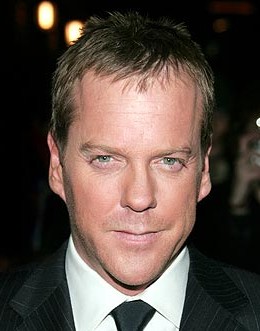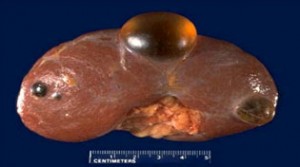“24″ Production Stopped- Kiefer Sutherland Undergoes Surgery

Production on the hit Fox series 24 has stopped because its star, Kiefer Sutherland, will undergo minor surgery. The procedure is said to be “related to a ruptured cyst near his kidney.” The rupture had occurred earlier in the week while he was working on the set, however production was able to continue without him until Friday. Sutherland’s publicist told the LA Times:
“While Kiefer Sutherland is frustrated to miss even one day of work, he and Fox decided together that it would be best to complete this minor elective procedure now as a precaution as opposed to six weeks from now when production wraps. He looks forward to returning to work next week.”
A cyst is a closed pocket or pouch of tissue that can form anywhere in the body. Cysts can be filled with air or fluid although kidney cysts usually contain fluid. They can vary greatly in size, from barely visible to as large as the kidney itself. The simple kidney cyst is different from the cysts that develop when a person has polycystic kidney disease, which is a genetic disease. Although its cause is not fully understood, the simple cyst is not an inherited condition. Simple kidney cysts become more common as people age. Nearly 30 percent of people over the age of 70 have at least one simple kidney cyst.
Most often, simple cysts do not cause symptoms or harm the kidney. In some cases, however, pain can occur when cysts enlarge and press on other organs. Sometimes cysts become infected or suddenly start to bleed. Less often the cysts impair kidney function. People with simple cysts are often found to have high blood pressure, although the cause-and-effect relationship is not well understood.
Kidney cysts are frequently found when taking pictures of the kidneys during computerized tomography (CT) scans and ultrasound exams being done for other reasons. When simple cysts are found but no complications are present, no treatment is needed.
(Left: Kidney cysts found on MRI, Right: Kidney with cysts)
Blood in the urine, or hematuria, is the most commonly reported sign of ruptured cysts within the kidney. This blood may be visible in the urine, or may only be seen under the microscope. Kidney cysts can also cause pain as a result of pressing against other structures in the body as they enlarge. The pressure generated by the growing cysts can cause them to rupture and cause pain in the back, sides, abdomen and hips. Kidney cysts can also become infected. If an infected cyst ruptures, the infection can spread throughout the abdomen.
If cysts cause symptoms, treatment may be needed. One procedure involves puncturing the cyst using a long needle inserted through the skin. The doctor uses ultrasound to guide the needle to the cyst. The cyst is drained and then filled with a solution containing alcohol to make the tissue harder.
If the cyst is large, surgery may be needed. Most procedures can be performed using a laparoscope, which allows for a smaller incision and quicker recovery. The surgeon drains the cyst then removes or burns away its outer tissue to prevent it from reforming. Most patients stay in the hospital 1 or 2 days.
For more information:
| Resounding Health(tm) Kidney Cysts |

























1 Comment